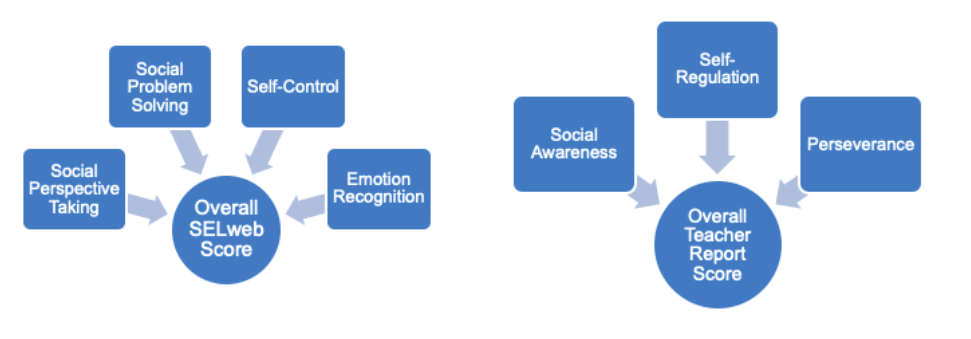Transforming Education (TransformEd) has been working with NewSchools Venture Fund on a multi-year project to assist schools in expanding their definition of student success to include academics, social-emotional competencies, and positive learning environments that support students’ development. As part of this project, TransformEd provides school leaders with the data, research, and support they need to improve student outcomes.
To that end, TranformEd has collected information on students’ social-emotional development in grades K-12 from innovative schools across the country. This includes a combination of student self-reports (grades 4-12), teacher reports of student competencies (grades K-12), and a web-based performance task developed by xSEL Labs, called SELweb (grades K-3). SELweb provides an alternative measure of students’ social-emotional development since traditional self-report measures for younger students may not be reliable.
Working together, we – the co-authors of this blogpost – have been investigating the question of how to use both teacher reports and SELweb results in concert to inform school practice around student social-emotional development. To address this question, we began by exploring the extent to which both measures assess the same underlying constructs.
We hypothesized that we would find a strong positive relationship between scores from both measures, since, as noted in the figure below, SELweb, and the teacher report measure used for this partnership, assess similar competencies, such as self-regulation/self-control and social awareness/social perspective-taking. However, we also know from research that different types of competencies are best measured in different ways. Direct assessments like SELweb may be better suited to assess students’ thinking skills, such as their ability to recognize their own and others’ emotions, while teacher reports may be better suited to assess students’ behavioral skills, such as their ability to exhibit self-control in classroom interactions. [1] As such, we might not expect a perfect correlation between scores from the two measures even if they are assessing overlapping competencies.

Based on results from descriptive analyses, we found that scores from the teacher report measure and SELweb are positively correlated with each other, suggesting that the two sources of data provide complementary measures of student SEL competencies in the schools we partner with. We also found that scores from teacher reports and scores from SELweb are positively and moderately related to students’ academic outcomes. This suggests that improving students’ competencies as assessed by either measure may contribute to improvements in students’ academic performance.[1]
The results from this practitioner-focused study – and that of prior literature – suggest that using multiple measures can provide a more holistic picture of students’ underlying social-emotional competencies. [2] However, we also recognize that educators can be inundated with data, with little guidance on how to use it. To provide educators with streamlined, actionable data, we are exploring ways to build results from teacher reports into the SELweb reporting platform. This will allow us to move closer to our shared goal of creating a “multimethod, multirater system” that goes beyond one type of measure to provide practitioners with deep insights and clear action plans to foster students’ social-emotional development.
[1] While our analyses were descriptive and not causal, prior evidence has shown a strong relationship between students’ SEL competencies and academic outcomes. See, for example, Moffitt, T. E., Arseneault, L., Belsky, D., Dickson, N., Hancox, R. J., Harrington, H., Houts, R., Poulton, R., Roberts, B. W., Ross, S., Sears, M. R., Thomson, W. M.,& Caspi, A. (2011). A gradient of childhood self-control predicts health, wealth, and public safety. Proceedings of the National Academy of Sciences, 108(7), 2693–2698. doi:10.1073/pnas.1010076108.
[2] McKown, C. (2017). Social-Emotional Assessment, Performance, and Standards. The Future of Children, 27(1), p. 157-176.
[1] McKown, C. (2017). Social-Emotional Assessment, Performance, and Standards. The Future of Children, 27(1), p. 157-176.


